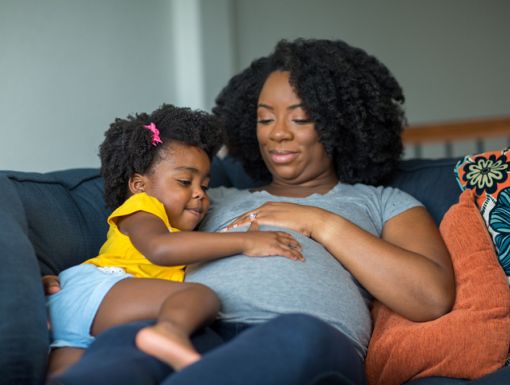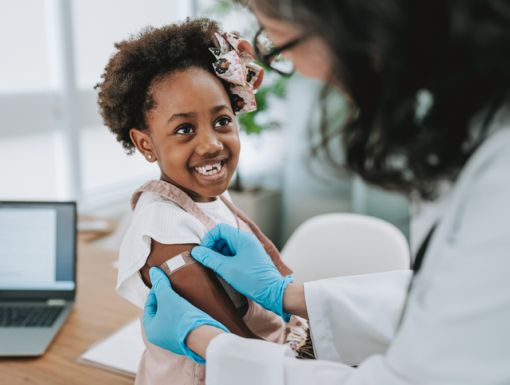
Top 4 Things Parents Need to Know About Children and Vaccines
Kids love to play, grab at random items and objects and even cough without covering their mouths. And despite parents reminding them to wash their hands often, there are still a variety of harmful germs in the community that will inevitably get them sick.
When a child comes into contact with a virus for the very first time, they become infected with a specific part of the virus called an antigen. The body recognizes that this antigen is not supposed to be present, so it starts producing antibodies. Your body’s antibodies fight the virus’s antigens in an effort to try and eliminate them so your body doesn’t become ill. The downfall to this concept is that it takes time for your body to develop these fighting antibodies. So, the first time the virus still causes your child to get sick. However, the next time your child becomes infected with this same virus, their body remembers the virus antigen and is able to produce antibodies faster than before, to lessen the severity of the illness, or sometimes even to prevent them from getting sick at all. Their body has now developed immunity and is able to protect your child from these harmful germs in the future and prevent disease from occurring.
How do vaccines work?
Vaccines use a tiny amount of the germ’s antigen that has been weakened, allowing your body to produce antibodies for future protection. Vaccines provide immunity before your body is infected with these actual germs, allowing you to fight off the infection better when encountered and preventing you from getting sick.
What is the recommend vaccination schedule for a child?
The Centers for Disease Control and Prevention (CDC) has recommended that a routine vaccination schedule be followed for children and adolescents aged 18 years or younger. This schedule has been reviewed and approved by the American Academy of Pediatrics (AAP), the American Academy of Family Physicians (AAFP), the American College of Obstetricians and Gynecologists (ACOG), as well as the Advisory Committee in Immunization Practices (ACIP).
Routine childhood wellness visits are scheduled according to age:
- 2 months
- 4 months
- 6 months
- 12-15 months
- 4-6 years
- 11-12 years
- 16-18 years
A vaccine catch-up schedule is also available to get pediatric patients back on track who have fallen behind with their vaccinations. It is A vaccine catch-up schedule is also available to get pediatric patients back on track who have fallen behind with their vaccinations. It is important to note that most schools and daycares require children to be immunized in order to protect your child and everyone around them.
What are the important childhood vaccinations?
- Hepatits A and B
- Rotavirus (a common diarrheal disease)
- Diphtheria, tetanus and acellular pertussus (DTaP, <7 years)
- Haemophilus influenza type B (Hib)
- Pneumococcal conjugate
- Influenza
- Inactivated poliovirus (IPV, <18 years)
- Measles, mumps, rubella (MMR)
- Meningococcal (ACWY and Group B)
- Human Papillomavirus (HPV)
- Tetanus, diphtheria, and acellular pertussis (Tdap ≥ 7 years)
What's the history behind vaccines?
With the implementation of routine immunizations, we have been able to eradicate many of our past most deadly diseases. Polio used to be very common in the United States and caused severe illness in thousands of people each year before polio vaccine was introduced in 1955. Thanks to the vaccine this disease is rarely encountered in the U.S. Before the measles vaccination program started in 1963, an estimated 3 to 4 million people got measles each year in the United States of which 400 to 500 died, 48,000 were hospitalized, and 1,000 developed encephalitis (brain swelling) from measles. Widespread use of the measles vaccine has led to a greater than 99% reduction in measles cases compared with the pre-vaccine era. However, measles is still common in other countries. Unvaccinated people continue to get measles while abroad and bring the disease into the United States and spread it to others. Chickenpox is a very contagious disease caused by the varicella-zoster virus (VZV). Each year, chickenpox caused about 4 million cases, about 10,600 hospitalizations and 100 to 150 deaths. Two doses of the vaccine are about 90% effective at preventing chickenpox. Human papillomavirus (HPV) is a very common virus that can lead to cancer. Nearly 80 million people—about one in four—are currently infected with HPV in the United States. Over 30,000 people in the United States each year are affected by a cancer caused by HPV infection. HPV vaccination provides safe, effective, and lasting protection against the HPV infections that most commonly cause cancer.
While vaccines are proven to be safe and effective, immunizations are not 100% disease-proof. Some people who are vaccinated against these vaccine-preventable diseases may still get the disease. However, it is usually a milder experience.
Additional vaccine resources
As a parent, it is your responsibility to make the right choices in the best interest of your children. Your healthcare provider is here to help guide and protect you and your family. If you have any questions, please feel free to contact your pediatrician or ask your local pharmacist.
For your reference, please visit the CDC’s website for a more detailed version of the recommended immunizations for children and adolescents.
References:
- Centers for Disease Control and Prevention (CDC, 2017). Why Are Childhood Vaccines So Important? Retrieved from https://www.cdc.gov/vaccines/vac-gen/howvpd.htm.
- Centers for Disease Control and Prevention. Polio Vaccination. Retrieved from https://www.cdc.gov/vaccines/vpd/polio/.
- Centers for Disease Control and Prevention. Measles Vaccination. Retrieved from https://www.cdc.gov/vaccines/vpd/measles/index.html.
- Centers for Disease Control and Prevention. Chickenpox/Varicella Vaccination. Retrieved from https://www.cdc.gov/vaccines/vpd/varicella/index.html.
- Centers for Disease Control and Prevention. Human Papillomavirus (HPV) vaccination and Cancer Prevention. Retrieved from https://www.cdc.gov/vaccines/vpd/hpv/index.html.



